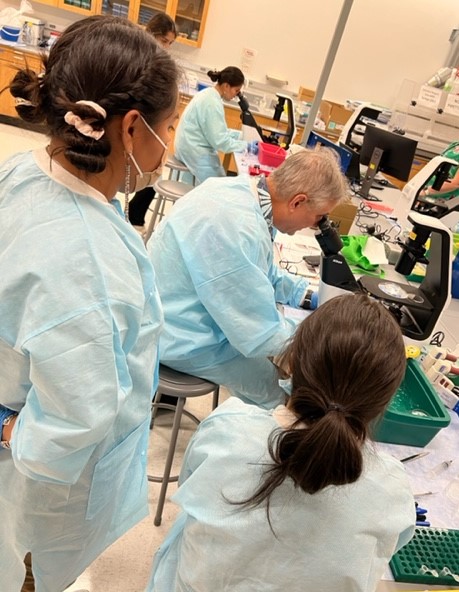
Education
TEACHING THE NEXT GENERATION
We are eager to train the next generation of basic and translational scientists interested in the biology of aging. We believe the biology of aging is modifiable through a variety of interventions enabling new opportunities for extending human healthspan.
The National Institute on Aging T32 Grant provides funding for pre-doctoral and postdoctoral trainees studying biology of aging using new omic technologies. Current trainees are researching immune aging, cellular senescence, autophagy, muscle biology and metabolism, cellular reprogramming, and lipid metabolism using approaches such as mass spectrometry, mass cytometry, and spatial genomics. Trainees are required to attend a one credit course each of the four semesters in which they are part of the T32, outlined below. They are also required to take the Mass Spectrometry and Proteomics Workshop held annually by the Center for Mass Spectrometry and Proteomics.
COURSES:
The Institute on Biology of Aging and Metabolism offers courses at the graduate level (4000). Click the tabs below to view the course information by level. Please visit the classes section of One Stop for information on how to register.
Fall semester - even years: BioC 8101 Fundamental Aging Biology
Director: Paul Robbins, Ph.D.
The goal of BIOC 8101 is for participants to gain a working knowledge of fundamental processes that drive aging and the Geroscience Hypothesis of Aging. It is also an objective of the course for participants to gain experience in critical thinking of the literature, asking focused, concise questions, and engaging in polite, respectful, and productive scientific discourse with peers.
Fall semester - odd years: BioC 8102 Topics in the Biology of Aging
Director: Laura Niedernhofer, M.D., Ph.D.
This course is intended to provide a platform of understanding about the major issues surrounding biological research in aging. This course will include a combination of student- and faculty-led discussions on select research topics that are highly relevant to the field of biogerontology research, along with instruction/discussions on scientific integrity. Student participants will lead discussions focused on their area of research expertise, utilizing a combination of review articles and research articles. Discussion of scientific misconduct will include case studies. This course is open to graduate students and post-doctoral fellows involved in the National Institutes on Aging (NIA) training grant. Functional Proteomics of Aging?. This course is also open to other graduate students or post-doctoral fellows who are conducting biological research in aging with instructor’s permission.
Spring semester - odd years: BioC 8103 Application of New Technologies to the Study of Biology of Aging
Director: Laura Niedernhofer, M.D., Ph.D.
This course is intended to provide a platform of understanding about the use of emerging ‘omics’ technologies in aging research. This course will include a combination of faculty- and student-led discussions on select topics geared towards understanding newer technologies such as mass cytometry and imaging, spatial genomics, and proteogenomics, and how trainees are actively applying them in their research. This course is directed to graduate students and post-doctoral fellows currently engaged in conducting research in the area of biological aging.
Spring semester - even years: BioC 8104 Fostering a Career in Aging Research
Director: Dawn Lowe, Ph.D.
This course is intended to provide a platform for preparing pre-doctoral students and post-doctoral fellows for the next step in their academic career. The course will include a combination of student- and faculty-led discussions on topics such as preparing for the job interview, composing a CV and cover letter, and developing a course syllabus based on the biology of aging. Trainees will also participate in a one-day symposium conducted by the MN Gerontological Society to raise their awareness of broad issues within the local aging community. This course is directed to graduate students and post-doctoral fellows currently engaged in conducting research in the area of biological aging.
Training
Are you interested in a research opportunity with us? There may be positions for postdoctoral fellows, graduate students from varying disciplines, and undergraduates seeking an internship! Please click the link below to apply or contact Kelly Holmes-Tomei at kholmest@umn.edu for more information.

Advancing Native American Diversity in Aging Research Course
iBAM hosts undergraduate students enrolled in the Advancing Native American Diversity in Aging Research Course (ADAR). The course is held annually in the month of August on the Twin Cities campus.